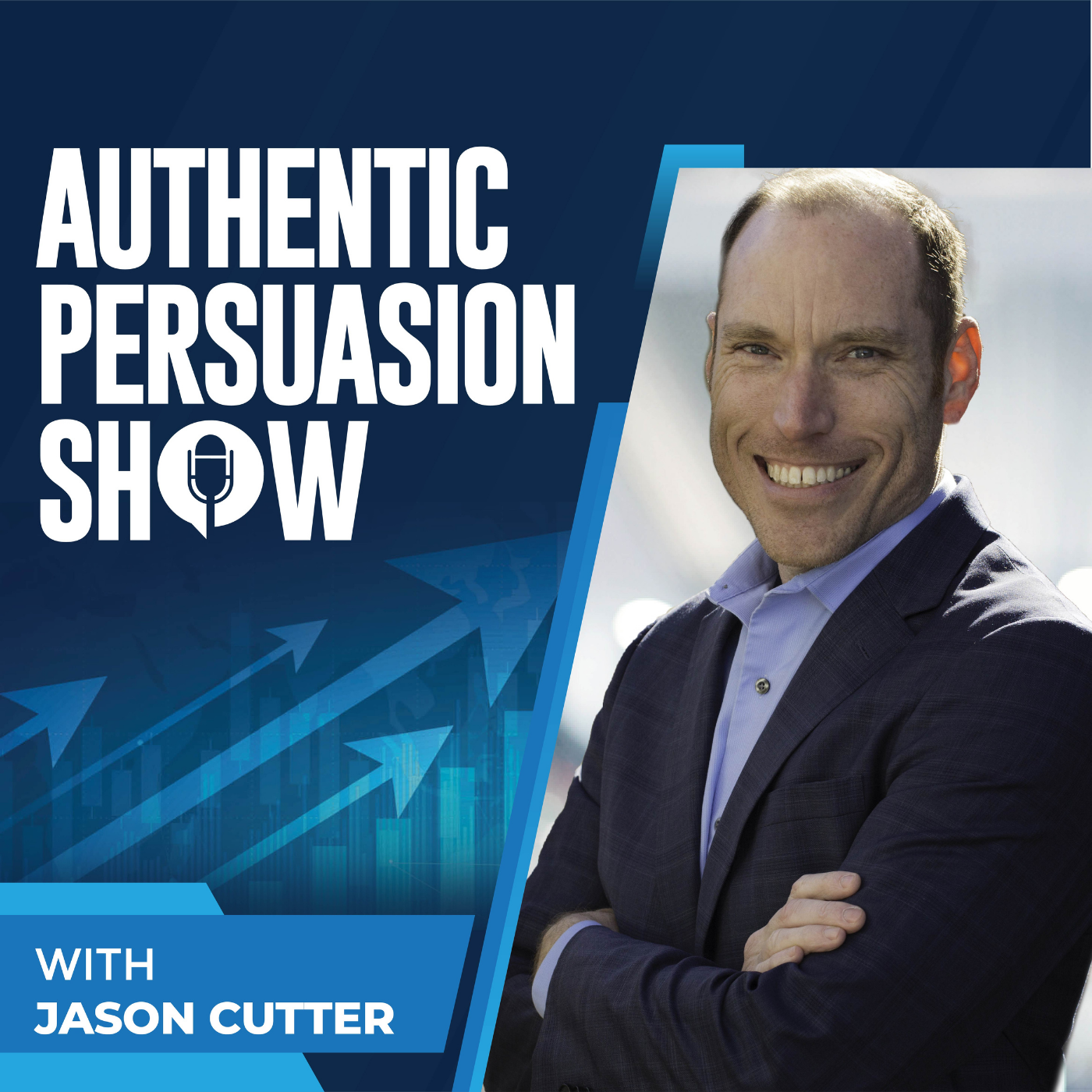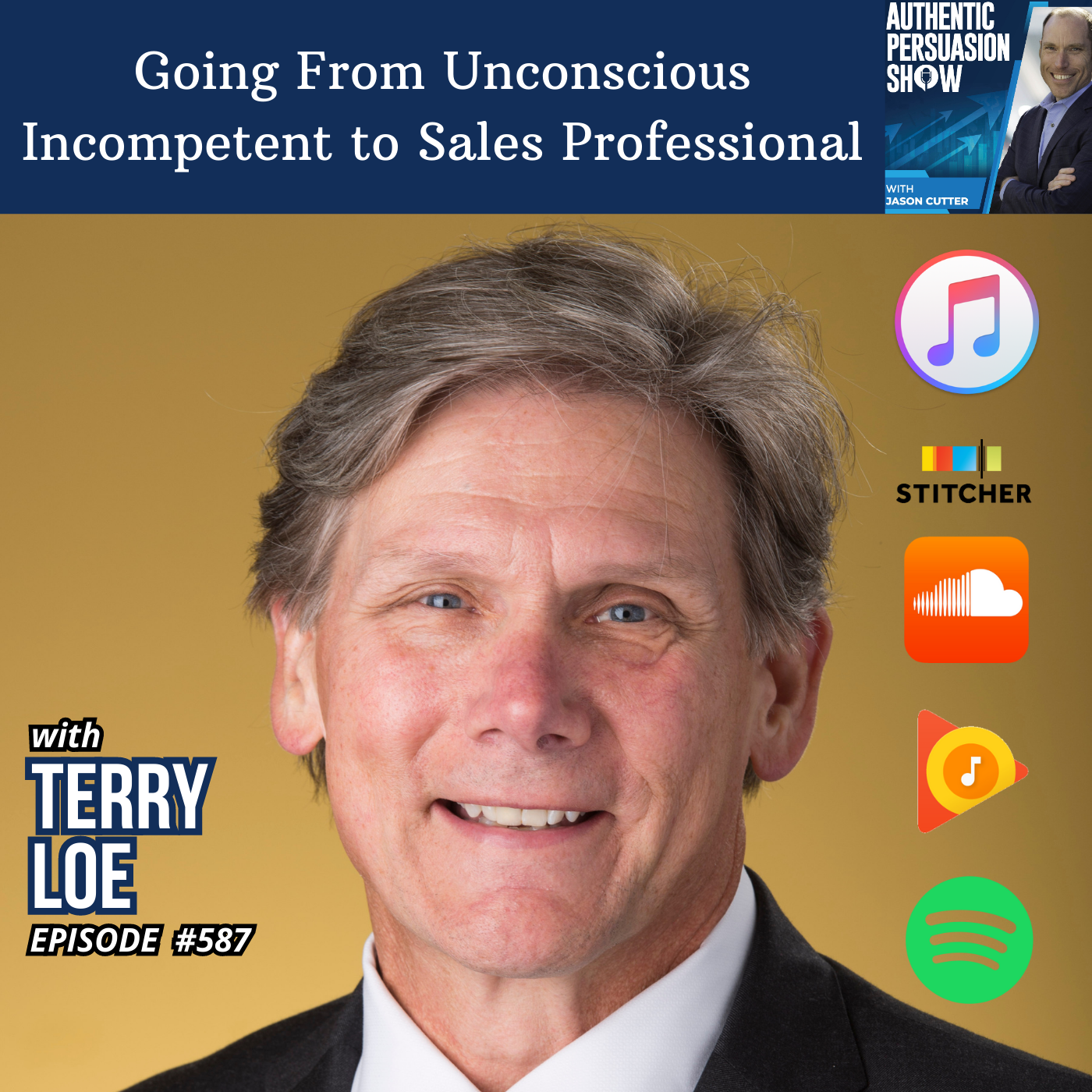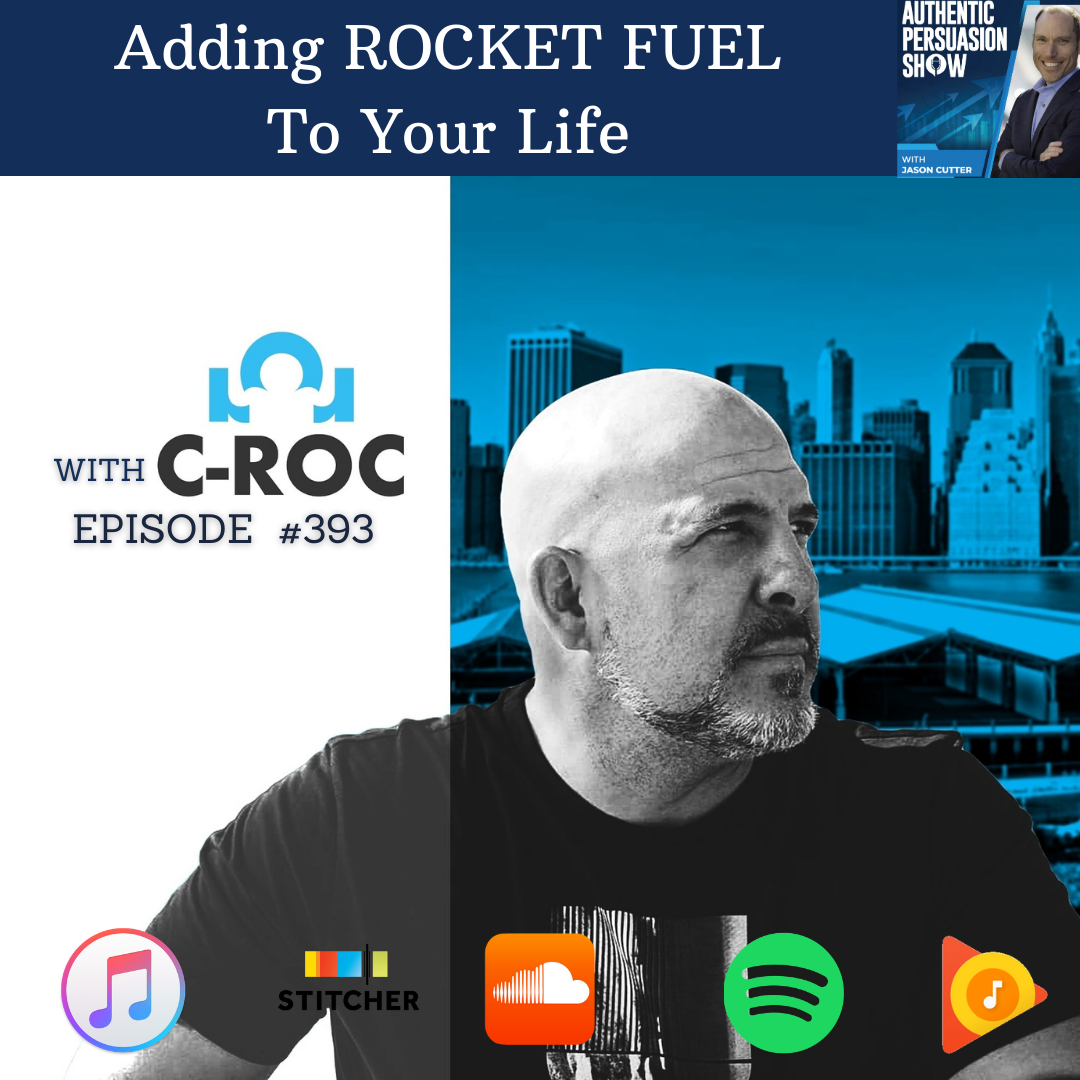Show Notes
This is the third segment of the conversation I had with Joe.
In Part 3, Joe and I talk about:
- Extending yourself, and all you do – to help people up in life
- Stop making one call and moving on!
- Do you actually feel good about what you do/sell?
Download The Power of Authentic Persuasion ebook
Enroll in the Authentic Persuasion Online Course
Connect with Jason on LinkedIn
Connect with Joe on LinkedIn
Joe’s Bio:
He is the founder of The Executive Recruiter Network, an Advisor to Facebook, a LinkedIn Consultant, and with his firm Tash Rizzo – he helps recruiting and staffing companies with their lead generation strategies.
Joe’s Links:
Website – https://tashrizzo.com/ or executiverecruiternetwork.com
E170 – Transcript
Jason: Alright. Welcome back to the sales experience podcast. My name again is Jason Cutter. This is part three of my conversation with Joe Rizzo from Tash Rizzo and he’s doing some amazing stuff in the world of recruiting and marketing and lead generation, but also sales. And so this is valuable stuff. If you didn’t make sure that you checked out part one and part two because this is a continuation. I know I say that each time around this part in the mini series, but it’s so important because each time it’s just a conversation there. We’re cutting up into four parts to make it easy to kind of keep up with each day and not feel overwhelmed. So make sure you check those out. Subscribe to the podcast everywhere that podcasts are available. It would mean a lot to me. Plus it would just help get this and, and again, I don’t mention this enough, but please make sure to share the podcast.
Jason: Anyone in sales, anyone who’s running a sales team owns a company where their sales people involved. Please help spread the word about how sales could and should be done for the salesperson. For the company and for the customers. I have over 150 episodes available. People can go back, they can find the ones that are valuable to them, but please make sure to share. I would appreciate that so much. And here you go. Here’s part three of my conversation with Joe.
Jason: Sometimes people can say, okay, well if I come from abundance, that means there’s more than enough. So we’ll have a conversation. And I talked about this, you know, in an episode before an order takers where it’s like, okay, if you want the deal, great, if not like whatever. There’s more fish in the sea. And I think that’s important to a point, except when you have a qualified prospect who you know, you can help, who will be better off with what you have, then it’s like a different pressure. It’s a different focus on wanting the deal, but it’s for them and not for you.
Joe: Yeah. So it’s itching on that. Like never want the deal more than them. But you’re right. Like, cause like I feel like I’m, I’m so hungry, I always want it for them. And maybe that’s part of it. I remember, you know? Yeah. Wanting it for them to see them bigger and I’m helping them on their journey and as, as a guide. So there’s times I’ve done personal development. I think when you’re coaching, there are some times that like, man, I want this more. Why do I want this? More your goals more than you do. You know, when you finally step back for a second, it’s okay because sometimes when you’re putting your hand to help somebody up, not a handout, but help them up like you’re seeing them better than they are. They might be so much in a hole that sometimes you are going to want it more than them.
Joe: So I think like you mentioned, the order taking, we can’t just go. So what, because you’ll miss that opportunity to help somebody. So if you believe that what you’re offering selling is it servers that’s going to help somebody, you kind of have an obligation to do it. And if you don’t, you know, who are we to not help people that said, look, if you’re, if your service is there, who are you to not do everything you can to help that person. So that’s all. I think I just would take a look at it from a little different standpoint of like, yes, there’s many more opportunities. I’m not tied in to the outcome of this sale as much as I am. The outcome of helping this person get from where they are to where I know that they can get to.
Jason: Yeah. And I think whether you like him or you don’t, you love him or you hate him, you know his persona. Grant Cardone says it’s your duty, right? Like it’s your duty to help someone. It’s your duty to sell to somebody who is and would benefit from what you’ve got. Like you’re actually giving up on them. You’re giving up on yourself, you’re giving up on your family. Like it’s your duty to do what you need to do to be successful and to help other people.
Joe: Yeah. And I think he does. I think he, he has that exact personality. They love him or hate him, but, but you can’t ignore him.
Jason: No, no, you can’t. That’s the marketing side, I’m sure that you appreciate for sure. So, yeah. So let’s talk about successful and unsuccessful salespeople in your experience. And you know, maybe it’s relative to what you do now because you’re working, you know, with recruiters and staffing agencies and helping them. So you kind of see from your, they’re your clients, right? Or they’re your prospects or it’s from yourself and your experiences. Like what makes successful sales reps, your sales people, you know, successful in your experience and you know, kind of understanding and what makes the unsuccessful ones? Like what are they missing?
Joe: Yeah. So I think when you look at someone that’s successful, and I’ve seen this across clients of ours, that, you know, when people look at a lead or an opportunity that comes in, and same thing with sales people is like you mentioned the certainly prejudging what that lead’s going to be. Is it good? Is it not good? Oh, they weren’t interested in giving up so quickly. I think those that are, you know, if I take a look and fundamental sides is like, did you do everything you can right off the bat? So if an opportunity comes in, did you do everything you could contact them, not just from a marketing standpoint, but now am I picking up the phone, this person at an incident having a conversation? Well, they responded on an email, I’m just gonna respond in an email, the same platform. While that’s great, it might just be that they respond to that platform because that’s how you reached out to them, right?
Joe: So oftentimes you’re like, well they responded to me on email or you know, they responded on to me via LinkedIn, so I’ll just get back to them that way. Well that might have been there one minute that they were on LinkedIn and they responded to you, but now this other student having a conversation and you’re waiting for them to respond back on LinkedIn, but they might be another two weeks he had just picked up the phone. So I think it’s those that take action and do it intentionally. Like have that intention of like I’m going to help this person. They expressed an interest and then get on that. So a lot of people wait for it to happen. Like, Oh I reached out. Okay, I’m just waiting for the call back. And they sit there looking at their phone while I emailed them. They opened my email.
Joe: But did you reach out? So I’ve seen same thing with clients that we’ve worked with that and this person expressed an interest why I responded to them. Yeah, but what else did you do? Did you make that phone call? He can’t just let marketing and automation do your work for you as a sales person. I think you’ve got to make those connections. You can let a law that make opportunities but you as a sales person and got to take that extra step to get them committed, to get them on the phone with you and actually get to know why you’re so great. So that’s what I’ve seen in sending from sales people. Quick side note, I remember we used to give people leads and then we’d talk about here’s where we’re buying early people that we would give leads to versus someone that bought the lead. Same source, everything. The person that got the leads did not close as many of the person that pays the leads.
Jason: Well that’s because you’re selling the good leads. Right?
Joe: And that was it. Exactly. The Glen. Yeah. These are the Glengarry,
Jason: It must be, and it must’ve been the good leads. That’s what you’re saving for.
Joe: Yeah. And so I see. It’s just, and they would take action cause now they were committed. Right. So you know, when you’re committed to your own process, you this having that process, like you’ve got to have not just a Mark across crosses. Now you’ve got gotta have the sales process. Did you follow it? Did you do all those things to make sure if you can check off all those boxes and didn’t get the sale, you know, then you can let some automation do the work. But you’ve got to do your job as a sales pressure and make sure that you gave every opportunity. And those that aren’t willing to exhaust every opportunity. Like you mentioned, where you have decided that you did everything for that lady that was selling her house, always just showing up at the court at nine 30 right.
Jason: Yeah, that’s true. Well, and I think that really comes down to one of the things that you said that you kind of move through quickly, but it’s so valuable. It’s like it just as gem in there is it the intention that separates and not separates it, but it defines the successful versus the unsuccessful. And again, using success in terms of closing deals, you know, money as a scoreboard indicator, not about a certain amount that you have to make, right? But more of like, are you successful? Are you doing what you can? Are you helping people? Are you closing deals? Are you making money?
Jason: Do you feel good about what you do? But it’s that intention because I see this all the time and it’s literally what you’re talking about, which is do you have the intention of being busy or the intention of making sales? Do you have the intention of reaching out to people, right and saying, Oh, I made my hundred phone calls today. Or is your, is your intention talking to five people or 10 people? Because if your intention is talking to let’s say five people, right every day, then you’re going to make as many phone calls as it takes to talk to five people versus I made a hundred calls, I left a hundred voicemails, I did a good job today, good job me. And then you know, you’re wondering why you’re not making any money and not closing enough deals. And so it’s that intention. When you get that person on the phone, what is your intention to help them?
Jason: To solve them or to check the box that yes, I’ve got a live person on the phone and you know, I can feel good because you know, I can check that box.
Joe: Wow, you are definitely listening in a third way or listening cause you, you picked up on that, which I didn’t even extract it. You just like on that and I love what you just said that because I’ve been guilty of that. Like, Hey activity. Like I was told, Hey, if you do enough activity, right,
Jason: Cause you can’t control your results, right? You can only control activity,
Joe: Right? So I just thought okay activity but you’re right, a hundred calls like I can make up. They didn’t answer the second one, don’t hang up there. There was, there’s about a hundred calls, a hundred calls, cause I’m hanging up quick enough to say I made the a hundred calls. But having the intention, I love the way you took that even further cause I’ve been guilty of that. Not understanding that side at a younger age like Hey I just do the activity.
Joe: But it wasn’t enough because my intention at that time was just to get done what I needed to get done. I later realized that everyone has a number, no matter how good at sales you are, you have a number. But you have to understand that deeper layer of your number is actually talking to people. It’s not you making a hundred phone calls, it’s you make them this many connections and conversations. Eventually you can distill that down to everyone’s numbers. You can improve upon your numbers, but everyone does someone have a number.
Jason: Yeah, and there’s a tough balance because it is a numbers game, right? There’s an activity level, right? I know people who knock on doors and it’s like, okay, for every 30 doors I knock on, I’ll talk to three people and then for every three people, I could close one or whatever their metrics are, right? Or it might be 60 to get one person to answer and one every four. So they know to close a deal, they’ve got a knock on 240 doors, right? And so you’ve got your numbers that generally work and that helps you set up your day or your week, and when it comes down to it and it’s in the fourth quarter, or you’re in overtime of your day and you don’t want to stop, are you going to keep going because you still haven’t gotten that fourth person to answer their door or answer the phone call, like there’s an over-under because you can’t control results, right?
Jason: You could have one of those days where you call a hundred people, you leave a hundred voicemails and you send a hundred emails and nobody’s responding and it’s just going into a black hole, let’s say on a Friday afternoon and you gave it a good shot, right? No matter what, you’re not going to be able to, to force your way through. But overall, like what’s your intention? So it’s, it’s a, it’s a balance
Joe: That’s great stuff. And somewhere down the road, those little eBooks up out, you’ll have a day where you hit 10 for 10 right? I thought I’d say those numbers, as long as you track them.
Joe: They do have a way of working out. And so that goes back to the question you asked earlier, is, is working harder and working smarter? Was I, how do I get to those? If it’s three conversations or six conversations, how do I get to them faster? And that’s again, some of the stuff I think I’ve gotten better at through marketing was like, Hey, how can I reach more people to get to those three to six conversations? How do I make sure I’m having those? And I just, hard work was always the answer and I just check in a lot of boxes.
Jason: Yeah. So since you’re a marketing guy and you’re basically in the lead generation business for other people, let’s talk about sales people on the other end receiving a lead, right? Obviously you can talk about it from your perspective and from everything you’ve done in the past, but so for the salespeople out there who are taking a lead, how do you set that up? How do you set like you yourself, how does Joe set up your clients to be successful with the marketing that they’re getting in ways that other salespeople, if they’re getting marketing, like what should they be doing when they get a new lead or you know, how do they process it? What do they need to know? How do they handle all of that? What’s Joe’s pro tips for receiving leads? Whether they’re good or bad, you know, Glen Berry or not.
Jason: Alright. That’s it for part three and a make sure to subscribe and tune in tomorrow for the final part of the conversation with Joe. Leave you like I always do, as always, keep in mind that everything in life is sales and people remember the experience you gave them.
![[E170] Sales Fundamentals with Joe Rizzo – Part 3 of 4](https://episodes.castos.com/salesexperiencepodcast/images/Joe-Rizzo-Cover-Image.png)


